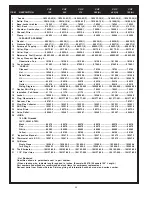
11
6. To turn the heater off, open the electrical disconnect switch. If the
heater is to remain inoperative for a long period of time, close the
shutoff valve on the oil supply line.
WATER TEMPERATURE CONTROL
DANGER
THIS WATER HEATER IS EQUIPPED WITH AN ADJUSTABLE
THERMOSTAT TO CONTROL WATER TEMPERATURE. HOT WATER
TEMPERATURES REQUIRED FOR AUTOMATIC DISHWASHER AND
LAUNDRY USE CAN CAUSE SCALD BURNS RESULTING IN
SERIOUS PERSONAL INJURY AND OR DEATH. THE TEMPERATURE
AT WHICH INJURY OCCURS VARIES WITH THE PERSONS AGE
AND TIME OF EXPOSURE. THE SLOWER RESPONSE TIME OF
CHILDREN, AGED OR DISABLED PERSONS INCREASES THE
HAZARDS TO THEM. NEVER ALLOW SMALL CHILDREN TO USE
A HOT WATER TAP, OR TO DRAW THEIR OWN BATH WATER.
NEVER LEAVE A CHILD OR DISABLED PERSON UNATTENDED IN A
BATHTUB OR SHOWER.
THE WATER HEATER SHOULD BE LOCATED IN AN AREA WHERE
T H E GENERAL PUBLIC DOES NOT HAVE ACCESS TO SET
TEMPERATURES.
SETTING THE WATER HEATER TEMPERATURE AT 120°F (48.9°C) WILL
REDUCE THE RISK OF SCALDS.
Some states require settings at specific
lower temperatures.
Figure 16 shows the approximate time-to-burn relationship for normal
adult skin. Short repeated heating cycles caused by small hot water
uses can cause temperatures at the point of use to exceed the
thermostat setting by up to 20°F. If you experience this type of use,
you should consider using lower temperature settings to reduce
scald hazards.
Temperature
Time to Produce 2nd & 3rd
Setting
Degree Burns on Adult Skin
180°F (82.2°C)
Nearly instantaneous
170°F (76.6°C)
Nearly instantaneous
160°F (71.1°C)
About 1/2 second
150°F (65.5°C)
About 1-1/2 seconds
140°F (60.0°C)
Less than 5 seconds
130°F (54.4°C)
About 30 seconds
120°F (48.9°C)
More than 5 minutes
FIGURE 16
Valves for reducing point-of-use temperature by mixing cold and hot
water are available. Also available are inexpensive devices that attach
to faucets to limit hot water temperatures. Contact a licensed plumber
or the local plumbing authority.
The water temperature is controlled by a thermostat, fig. 17, which
has two sensing elements. One sensor is located near the top of
the tank and the other is near the center. The thermostat is set in the
lowest position before the heater leaves the factory.
The thermostat temperature dial, fig. 17, is accessible by taking off the
access cover and removing the control cover. The dial is adjustable
and may be set for 120° (48.9°C) to 180°F (82.2°C) water
temperature, but 120°F (48.8°C) is the recommended starting point.
It is suggested the dial be placed in the lowest setting which produces
an acceptable hot water supply. This will always give the most
energy efficient operation. The temperature control has a 4°F (2.2°C)
fixed differential.
HIGH LIMIT SWITCH (E.C.O)
The dual bulb controller (fig.17) contains the high limit (energy cutoff)
sensor. The high limit switch interrupts main burner gas flow should
the water temperature reach 195°F (90.5°C).
In the event of high limit switch operation, the appliance cannot be
restarted unless the water temperature is reduced by 20°F
(11.1°C)(approx.) and the high limit reset button on front of limit control
(fig.17) is depressed.
Continued manual resetting of high limit control, preceded by higher
than usual water temperature is evidence of high limit switch
operation. Contact your dealer or servicer if continued high limit
switch operation occurs.
DUAL-BULB THERMOSTAT (COVER REMOVED)
FIGURE 17
BURNER CERTIFICATE (COMBUSTION TEST)
The Commercial Standard CS75 Oil Burner Certificate form must be filled
in and posted in the vicinity of the water heater.
Instructions for filling in certificate are on the back of the certificate. This
must be done by the installer at the time the heater is first operated. The
certificate is in the oil burner manual.
SELF- CLEANING ELIMINATOR
These units include a self-cleaning eliminator installed in the front
water inlet. See figure 18. The eliminator must be oriented correctly
for proper function. There is a marked range on the pipe nipple
portion of the eliminator, that must be aligned with the top of the inlet
spud. A label above the jacket hole has an arrow that will point to the
marked portion of the pipe nipple if the orientation is correct. If the
arrow does not point within the marked range on the pipe nipple,
adjust the pipe nipple to correct. A pipe union is supplied with the
eliminator to reduce the probability of misaligning the eliminator
accidentally while tightening the connection to the inlet water supply
line. Improper orientation of the eliminator can cause poor
performance of the heater and can significantly reduce outlet water
temperatures during heavy draws.
FIGURE 18












































